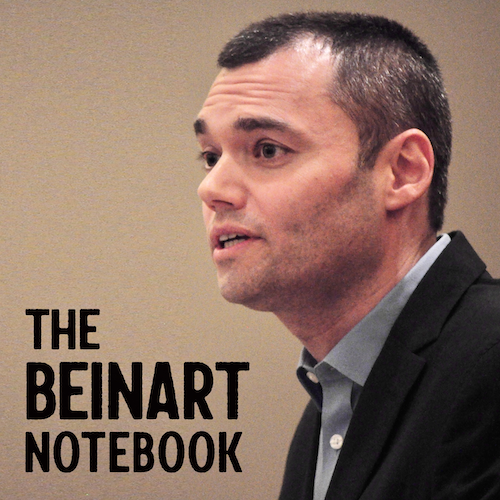The Beinart Notebook is a Substack site with a weekly “show” (via Zoom) in which the journalist Peter Beinart discusses issues concerning Israel-Palestine with his guests. These presentations are a marvelous, even inspiring, model of rational conversation about politics. Given the vast amount of money and weapons the United States has given to Israel, the Beinart Notebook should be required viewing for all Americans who care not only about how their tax dollars are being spent but about actions being taken in their name.
In order to explain why I hold Beinart’s show in such high regard, I will begin with Plato’s Republic. I am a scholar of ancient philosophy, after all, but I also think that viewing the Israel-Palestine conflict through the lens of the Republic helps us understand the condition of our own democracy. I am also a secular American Jew who lived in Israel for a year, has friends there, and cares deeply about its fate.
Plato was a masterful writer, and the opening scene of the Republic is a fine example of his literary skill. Its narrator is Socrates, who reports that he had visited the Piraeus, the seaport of Athens, which is located some six miles from the Acropolis. With his companion Glaucon, he was on his way home when he was intercepted by a man named Polemarchus and several of his friends. Polemarchus insisted that Socrates stay in the Piraeus and have dinner at his place. After briefly resisting, he succumbed to Polemarchus’ pressure. Here is the first part of their exchange (in my translation):
Polemarchus said, “Socrates, you seem to me to be hurrying away and eager to get back to town.”
“Not a bad guess,” I replied.
“But,” he said, “don’t you see how many we are?”
“Of course.”
“Okay, then,” he said. “Prove yourself to be stronger than these men here or stay in the Piraeus with us.”
“But isn’t there another option?” I asked. “We could persuade you that you should let us go.”
“But could you persuade us,” he replied, “if we don’t listen?”
“No way,” Glaucon interjected.
“Well, you’d better understand this,” Polemarchus said. “We are not going to listen.” (Republic 327c).
On the one hand, this exchange is no more than a bit of playful banter, something like two friends “fighting” over who will pay a check. On the other, it alludes to a fundamental question, one at the heart of political philosophy itself: Does might make right? When Polemarchus asks, (mock-) threateningly, “don’t you see how many we are?” he implicitly suggests the answer is yes. When Socrates counters by raising the possibility of persuading him that he should reconsider and allow them to go home, he is proposing that they talk rather than fight.
This little scene foreshadows what will become the overriding question of the Republic: What is the source of legitimate political authority? In other words, what makes a state (in Greek, a polis) truly just? All states impose constraints upon their citizens who must be required to do things they would prefer not to do, such as paying taxes, curbing their desires for the property of others, and serving in the military. The government has the authority to secure their compliance. But not all forms of governing are just. To cite an extreme example, tyrants unilaterally issue edicts, demand obedience, and do not allow dissent. Their authority derives exclusively through force. By contrast, in a democracy, citizens agree to abide by laws that they themselves (or their elected representatives) have made. This was the system in ancient Athens. Its Assembly had the final say on most issues, and in it, every citizen was allowed to participate. (Of course, the thousands of slaves and foreign residents in Athens were not citizens. Athenian women did not have full citizenship rights nor were they allowed to vote in the Assembly or serve on juries.) It was a hotbed of debate in which speakers competed for the votes of their fellows. Instead of threatening force, they attempted to persuade one another.
Socrates’ questions to Polemarchus—“Isn’t there another option? We could persuade you that you should let us go”—seem to signal that he is an advocate of democracy. This, however, is not quite the case, for there are, broadly speaking, two kinds of persuasion: the rational and the irrational. Socrates champions only the former. What he would like to do is explain to Polemarchus the reasons why he should be allowed to go home. He would then offer Polemarchus a chance to raise objections, and a civil and respectful argument would ensue. Its winner would, ideally, be the one who presented the best, the most truthful, reasons. It would be decided by what the Greeks called logos, whose several meanings include “speech” and “language,” but also “reason” and “rational argument.”
The second kind of persuasion relies on emotional manipulation and fabrication, and its only measure of success is whether it effectively persuades the audience to accept a belief, regardless of whether it is true or not. Socrates calls this “sophistry,” and he despises it. The sort of logos he favors is dialogue in which the participants give and defend reasons, and ask each other questions. Its goal is not simply winning an argument but gaining knowledge.
As the Republic unfolds, we learn that precisely this valorization of rationality informs Socrates’ conception of a just polis. Rather than being elected, its rulers would be appointed on the basis of their exceptional intelligence and character. They would receive a comprehensive education at whose conclusion they would then dedicate themselves entirely to working for the common good. Unlike “the many” (hoi polloi) who are governed, these “philosopher kings” would understand what “the good” really is. It appears, then, that although he lived in one, Socrates was no great friend of democracy.
The salient moment of the opening scene comes when Polemarchus rejects Socrates’ proposal to talk rather than fight. He declares that he will not listen, and thereby forecloses the possibility of being persuaded (either rationally or irrationally) to change his mind. The Republic, then, begins on an ominous note, for it reminds readers that many, perhaps most, people either cannot or are unwilling to listen. Close-minded and uninterested in learning, they are impervious to rational argument. The opening scene thus seems to indicate that, for Plato, the political arena will never be anything but a violent, stupid power struggle in which truth is irrelevant.
Finally, on to the Beinart Notebook. Peter Beinart is one of the only public figures I have encountered who is an excellent listener and genuinely cares about the truth. Moreover, unlike Plato, when it comes to politics, he is optimistic about both the possibility of political discourse and a democratic polis. Although he surely knows that the world is filled with people like Polemarchus, he is determined to engage in and share rational conversation. Despite formidable obstacles, he has not given up on the attempt to persuade other people to think hard and reconsider their views.
After graduating from Yale in 1993 and then winning a Rhodes Fellowship to study at Oxford, Beinart began his career as a journalist at The New Republic in 1995. He became its editor in 1999, a position he held for seven years. His work has appeared regularly in a wide variety of publications, including The New York Times and the Israeli newspaper, Haaretz. He is presently the editor-at-large of Jewish Currents and a Professor of Journalism and Political Science at City University of New York.
A prominent feature of Beinart’s career is that he has changed his mind. The New Republic strongly supported the American invasion of Iraq in 2003, a decision Beinart now regrets. He changed because he learned something: the war in Iraq was justified on the basis of a false claim—that Saddam Hussein possessed weapons of mass destruction—and it proved to be a disaster for both the United States, with over 4,000 soldiers killed and 32,000 wounded, and Iraq, which suffered some 200,000 civilian casualties.
An even more impressive turn on his part is that Beinart, an observant Jew and once a staunch Zionist, has become a critic of both Israel and its American enablers. Remarkably, and courageously, he is now willing to call the 1948 war by the name given to it by Palestinians: the nakba, or “catastrophe.” He arrived at his present position—that Palestinians and Israeli Jews would only have equal rights in a unified, binational state—by listening, studying, and reconsidering his own views. As he explained in a New Yorker profile (May 23, 2021), his change of heart began when he “started reading…Palestinian writers and historians: Ali Abunimah, Mahmoud Darwish, Edward Said.” From them, he learned not only what Israel had actually done to the Palestinians in 1948—displace some 700,000 people from their homes, sometimes by means of terrible violence—but also about the conditions in which they have been forced to live since then in Gaza and the West Bank. At the same time, he was hugely impressed with the “generosity of these [Palestinian] writers, and the empathy they showed toward the Jewish experience.” In short, Beinart came to understand that, by and large, Palestinians are not bloodthirsty antisemites. Instead, they are, first and foremost, a people who have been uprooted and deprived of their rights, and their claim that Israel has long been engaged in ethnic cleansing has merit.
As his views evolved, Beinart came to acknowledge the enormous power wielded by the pro-Israel lobby in the United States and how fearful American politicians are of crossing it. That he is undoubtedly right about this, one need only consider the recent Democratic primary in New York’s 16th congressional district. The incumbent, Jamaal Bowman, was running for re-election, and the American Israel Public Affairs Committee (AIPAC) spent over 20 million dollars in support of his opponent, George Latimer. Bowman’s sin? He had criticized Israel and pushed for a ceasefire in Gaza. Bowman lost the race, and one of the few such voices in Congress was silenced.
Peter Beinart’s evolution from Zionist and supporter of American militarism to a critic of both must have been difficult. He is a religious Jew whose love and knowledge of Judaism are deep and whose paternal grandparents had to flee their home in Lithuania.
The Beinart Notebook invites its audience to participate in a similar process of self-examination. It urges them to do something few Americans ever do: listen to Palestinians whose voices are rarely heard in the mainstream media. To name just a few of his Palestinian guests: Laila Al-Arian is the executive producer of “The Night Won’t End,” which Beinart describes (in the introductory email that always accompanies the link to his episodes) as “an extraordinarily powerful documentary about three families in Gaza during this war.” He has talked with Ghassan Abu-Sittah, Musallma Abu Khalil, and Lina Qassen-Hassan, three physicians who have worked in Gaza. Their descriptions of hospitals razed by Israeli bombs and the horrific conditions in which medical personnel there are trying to save lives, are chilling. He has interviewed Sally Abed, “a Palestinian from Haifa and leader of Standing Together, which brings Jews and Palestinians together to struggle for justice and peace.” These are painful conversations and there are times, I must admit, when I am tempted to turn away from them. I now consider it my responsibility not to do that.
Beinart regularly interviews Arab scholars. Rami Khouri, for example, is a Fellow at the American University of Beirut and a columnist for Al Jazeera Online. Rashid Khalidi, whom Beinart describes as “America’s most eminent historian of the Palestinian people and the Palestinian struggle,” is the author of the book, The Hundred Year War on Palestine. One of the most informative of his guests was Ussama Makdisi, author of The Age of Coexistence; The Ecumenical Frame and the Marking of the Modern Arab World. From Makdisi I learned that, prior to the arrival of the Zionists in Palestine, the sort of antisemitism that for centuries infected Christian Europe was largely absent in the Arab world. He argues that during the Ottoman Empire the notion of an “Arab Jew,” which sounds oxymoronic today, made good sense.
Another guest who taught me much was Geoffrey Levin, author of Our Palestine Question. As Beinart puts it, this book “explores a largely unknown history of American Jewish criticism of Israel in the first decades of its existence and how it was quashed.” That Jews once actively disagreed with one another about what Israel should be is an urgent reminder of how oppressive the present moment has become, for today almost any criticism against Israel is condemned as antisemitic.
Every episode of the videos can be found in the website’s archive. Among the most impressive of these discussions are the ones with Israeli Jews who, despite facing a torrent of denunciation from their neighbors, are nonetheless vocal critics of their own country. Omer Bartov, for example, “is one of the world’s most prominent scholars of the Holocaust. He’s also an Israeli who has warned about the genocidal rhetoric of some Israeli leaders since October 7.” Yael Sternhell, a Professor of History at Tel Aviv University, is the daughter of a Holocaust survivor and a long-time peace activist. She is distraught at what Israel has become and, despite her love for her country, she told Beinart that she is not sure whether she will return after spending next year as a visiting professor in the United States. Especially poignant was the conversation Beinart had with Efrat Machikawa, whose uncle was abducted by Hamas on October 7, and Boaz Atzilli whose cousin lived in Kibbutz Nir Oz and was among the dozens of its residents who were killed. Despite suffering unspeakable loss, both deplore the destruction of Gaza and are calling for a ceasefire. Their perseverance should give us all pause.
Another set of voices to whom Beinart has introduced me are Arab-American politicians. Abdullah Hammoud is the mayor of Dearborn, Michigan, the largest city with an Arab-American majority in the United States. Rania Batrice is a Palestinian-American consultant who served as deputy campaign manager for Bernie Sanders’ 2016 presidential campaign. James Zgoby is the president of the Arab-American Institute and a former member of the executive board of the Democratic National Committee. Frustrated (to put it mildly) at how Americans have been trained to view the Israel-Palestine conflict almost exclusively through the lens of Jewish victimhood, these people have somehow managed not to lose faith in our democracy.
In addition to his conversations, Beinart sends a weekly video to his subscribers. In these, he gives a brief (ten-minute or so) lecture in which he argues in his own voice for a specific thesis. These talks are clear, straightforward, and hard-hitting. Their titles tell much: “Twenty Years After the Iraq War and Washington Hasn’t Learned Much At All.” “Even Destroying Hamas Won’t Make Israel Safer.” “To Save the Hostages, End the War.” “You Can’t Claim to Defend Liberal Democracy and Attend Netanyahu’s Speech to Congress.” “Israel Can’t Win This War: Palestinians Told Us That from the Beginning.” “Facing the Horror in Gaza.” “Loving Jews Whose Views We Hate.” These are monologues but, characteristically, the Beinart Notebook invites its audience to respond during his weekly “Ask Me Anything” sessions.
In closing, I will quote at length from the note that accompanied Beinart’s dialogue with The New York Times columnist Bret Stephens, a fierce supporter of Israel, for it illustrates precisely what I find so admirable in him. (The emphases below are my own.)
I invited Bret because I believe in talking to people with whom I disagree profoundly… my instinct is to err on the side of dialogue, especially when it comes to Israel-Palestine, for several reasons.
First, I’m fallible. I’m old enough to have been wrong about some very big things in the past. I’m sure I’m wrong about certain things today. Listening to people with whom I disagree—not just reading them but probing their views in the way one only can through conversation—can help surface the flaws in my own thinking.
Second, I’m in the persuasion business. I want to persuade everyone. But I especially want to persuade Jews—and especially those Jews who influence Israeli and US policy—that a grave evil is being committed in our name. That’s an intellectual and emotional challenge. It requires understanding the arguments marshalled to justify Israeli and American behavior and, just as importantly, to understand the fears and passions that underly those justifications. In my experience, the best way to do that is by talking and listening.
As someone who has worked in a university for over 40 years, I have heard any number of academics praise the idea of dialogue, but have met few who can listen well enough actually to practice it. Beinart is a wonderful exception.
The quotation above reveals something else about Beinart. Unlike Plato, he is optimistic when it comes to the possibility of rational conversation about politics. As he puts it, “he’s in the persuasion business.” While hardly naïve about the human propensity to be close-minded, he is nonetheless animated by the conviction that people, even those who are in power, can change their minds if they are presented with good enough reasons to do so. Furthermore, unlike Socrates who constructed an ideal city in the Republic in which philosopher-kings rather than the people (demos) rule, Beinart is a firm believer in democracy and deeply committed to its cardinal principles: consent of the governed, persuasion rather than force, equality under the law, and universal human rights. The Beinart Notebook consistently exhibits these values with great lucidity and intelligence. As such, it is a vital resource and a beacon of hope in an America that sorely needs it.
David Roochnik
After teaching Ancient Greek Philosophy for forty years, and having written seven books and more than forty articles, David Roochnik retired from Boston University in 2020. He is now devoting most of his considerable energy to what used to be his hobby: writing fiction.








